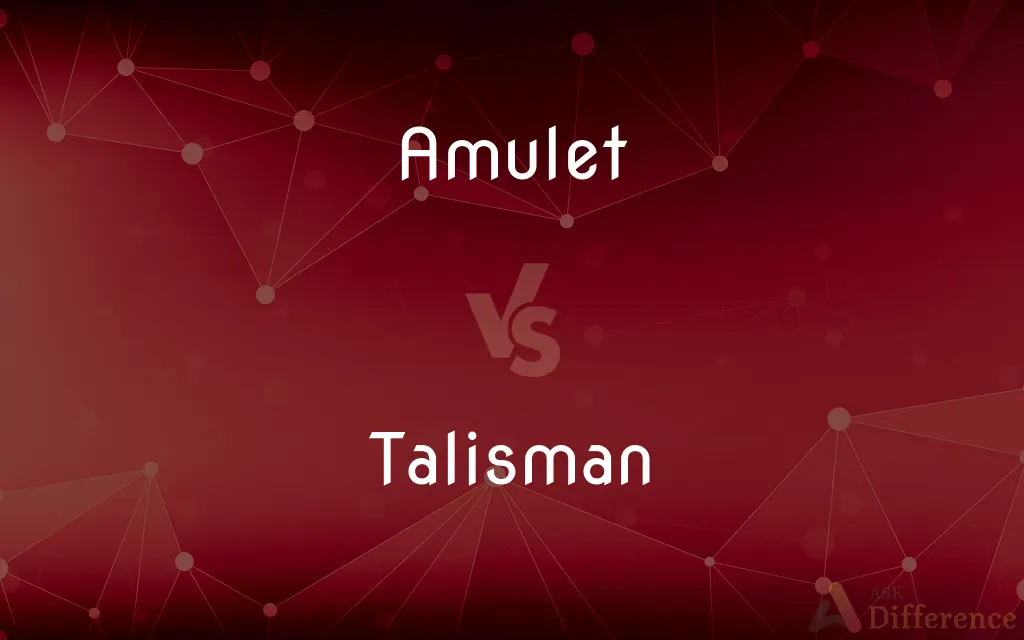Amulet vs. Talisman — What's the Difference?
Edited by Tayyaba Rehman — By Fiza Rafique — Updated on April 3, 2024
Amulets are protective objects, often worn, while talismans are believed to bring luck or power to the bearer.

Difference Between Amulet and Talisman
Table of Contents
ADVERTISEMENT
Key Differences
Amulets are traditionally considered objects with natural protective properties, often used to ward off evil, negativity, or illness. They can be made from various materials like gemstones, metals, or even plants and are sometimes inscribed with symbols or words for enhanced protection. Talismans, on the other hand, are created to draw in specific energies or powers, such as good luck, strength, or love. Unlike amulets, which are more passive in their protective role, talismans are often charged with specific intentions by their maker or bearer.
While amulets are primarily associated with protection from negative influences, talismans are more focused on attracting positive forces. Both can be personalized for the individual, but the way they are used and the beliefs surrounding them differ.
Amulets and talismans can sometimes overlap in purpose and appearance, but their underlying intentions distinguish them. For instance, a piece of jewelry might serve as an amulet if its primary purpose is to protect the wearer from harm, whereas it would be considered a talisman if its main function is to attract love or success.
Despite their differences, both amulets and talismans play significant roles in various cultures and belief systems. They reflect the human desire for protection, luck, and control over unseen forces, highlighting the diverse ways people seek to influence their lives and environments.
Comparison Chart
Primary Purpose
Protection from harm
Attraction of specific energies
ADVERTISEMENT
Nature
Defensive
Offensive
Associated With
Warding off evil, negativity
Bringing luck, power
Material
Gemstones, metals, plants
Any, often with specific symbols
Customization
Yes, for enhanced protection
Yes, charged with intentions
Compare with Definitions
Amulet
An object believed to have the power to protect its holder.
The ancient amulet was thought to ward off spirits.
Talisman
An object thought to bring good luck or have magical properties.
She kept a talisman in her purse for good fortune.
Amulet
A charm, often inscribed with a magic spell or symbol.
His grandfather passed down a protective amulet.
Talisman
A charm to attract a specific energy or aid in particular endeavors.
The writer wore a talisman to inspire creativity.
Amulet
Any object intended to bring protection to its owner.
The traveler carried an amulet made of herbs.
Talisman
An object charged with the power by a magician or wise person.
The talisman was blessed by a sage for strength.
Amulet
A small object worn to protect the wearer from evil, danger, or disease.
She wore a jade amulet around her neck for protection.
Talisman
A piece of jewelry believed to endow the wearer with specific qualities.
His talisman was designed to attract wealth.
Amulet
A talisman specifically for protection.
The silver amulet was engraved with protective runes.
Talisman
An amulet or object with a specific purpose beyond protection.
The crystal talisman was meant to enhance spiritual awareness.
Amulet
An amulet, also known as a good luck charm, is an object believed to confer protection upon its possessor. The word "amulet" comes from the Latin word amuletum, which Pliny's Natural History describes as "an object that protects a person from trouble".
Talisman
A talisman is any object ascribed with religious or magical powers intended to protect, heal, or harm individuals for whom they are made. Talismans are often portable objects carried on someone in a variety of ways, but can also be installed permanently in architecture.
Amulet
An object worn, especially around the neck, as a charm against evil or injury.
Talisman
An object, typically an inscribed ring or stone, that is thought to have magic powers and to bring good luck
He called me his good luck talisman
Those rings, so fresh and gleaming, were their talismans
A dolphin talisman would ensure a safe journey on land or at sea
Amulet
A kind of protective charm or ornament, often bearing magical symbols, worn for protection against ill will, negative influences, or evil spirits.
Talisman
An object marked with magic signs and believed to confer on its bearer supernatural powers or protection.
Amulet
An ornament, gem, or scroll, or a package containing a relic, etc., worn as a charm or preservative against evils or mischief, such as diseases and witchcraft, and generally inscribed with mystic forms or characters. [Also used figuratively.]
Talisman
Something that apparently has magic power.
Amulet
A trinket or piece of jewelry thought to be a protection against evil
Talisman
A magical object providing protection against ill will, or the supernatural, or conferring the wearer with a boon such as good luck, good health, or power(s).
Talisman
To be worn as a talisman.
Talisman
A magical figure cut or engraved under certain superstitious observances of the configuration of the heavens, to which wonderful effects are ascribed; the seal, figure, character, or image, of a heavenly sign, constellation, or planet, engraved on a sympathetic stone, or on a metal corresponding to the star, in order to receive its influence.
Talisman
Hence, something that produces extraordinary effects, esp. in averting or repelling evil; an amulet; a charm; as, a talisman to avert diseases.
Talisman
A trinket or piece of jewelry thought to be a protection against evil
Common Curiosities
How does a talisman work?
A talisman is believed to bring good luck or possess other positive qualities, often tailored to specific desires or intentions.
What materials are amulets made from?
Amulets can be made from various materials, including gemstones, metals, and plants.
How do you choose an amulet or talisman?
The choice depends on the intended purpose, whether for protection (amulet) or to attract specific energies (talisman).
Do amulets and talismans need to be blessed?
While not always necessary, many believe that blessing these objects enhances their effectiveness.
What is an amulet?
An amulet is an object worn for protection against negative energies, evil, or harm.
Can an object be both an amulet and a talisman?
Yes, an object can serve both purposes if it is intended for protection and to attract certain energies.
Is there a difference in the effectiveness between amulets and talismans?
Effectiveness is subjective and may depend on the belief and intention of the bearer.
Are there any cultures that specifically use amulets or talismans more?
Various cultures around the world use both, though the specific forms and beliefs may vary.
How are amulets and talismans activated?
They can be activated through rituals, blessings, or by charging them with specific intentions.
Are talismans always worn?
While talismans are often worn for personal benefit, they can also be placed in certain areas to attract positive energies.
Do amulets protect against physical or spiritual harm?
Amulets are believed to offer protection against both physical and spiritual harm.
How long have amulets and talismans been used?
Both have been used for thousands of years across various cultures for protection and luck.
Can anyone create a talisman?
Yes, with the right intentions and knowledge, anyone can create a talisman.
Can talismans help in love or career?
Yes, talismans can be specifically crafted to attract love, success in career, or other personal aspirations.
Can the power of an amulet or talisman fade over time?
Some believe the power of these objects can diminish and may need to be recharged or blessed again.
Share Your Discovery

Previous Comparison
Decantation vs. Filtration
Next Comparison
Institution vs. OrganizationAuthor Spotlight
Written by
Fiza RafiqueFiza Rafique is a skilled content writer at AskDifference.com, where she meticulously refines and enhances written pieces. Drawing from her vast editorial expertise, Fiza ensures clarity, accuracy, and precision in every article. Passionate about language, she continually seeks to elevate the quality of content for readers worldwide.
Edited by
Tayyaba RehmanTayyaba Rehman is a distinguished writer, currently serving as a primary contributor to askdifference.com. As a researcher in semantics and etymology, Tayyaba's passion for the complexity of languages and their distinctions has found a perfect home on the platform. Tayyaba delves into the intricacies of language, distinguishing between commonly confused words and phrases, thereby providing clarity for readers worldwide.














































